As human beings, we all have our types. This holds true in fiction as well as life, the traits that resonate with us and help us form friendships and deeper attachments. The attributes that we recognize in ourselves that help us to better understand our own feelings and foibles. Types are useful for helping us organize the bits and pieces of being alive that don’t always make sense to us.
When I started watching She-Ra and the Princesses of Power, I instantly recognized Catra as one of my types.
[Spoilers for the series finale of She-Ra below.]
Of course, I wasn’t alone in that feeling—Catra was an instant favorite on the show among its fans. But there was something about it that nagged at me, something more specifically related to her type, and what that type said about me, and what it meant that I kept returning to it.
Catra falls into a category that I mark as “Foils With Inferiority Complexes”: They are characters who are very close to a particular protagonist, who they are a bit unhealthily obsessed with. (They are often queer, or queer-coded, which is hardly a surprise.) They are in many ways that protagonist’s equal, though they don’t always believe it. They are often abused by authority figures, which causes them to lash out in increasingly violent and harmful ways. They are villains, but villains with deeply emotional motives. And one of their most desperate needs—though they’d never admit it—is getting their equal opposite, the protagonist they are so enamored of, to clarify their importance.
On Doctor Who, it’s the Master. In the MCU, it’s Loki. On She-Ra, it’s Catra. And there are countless more.
These relationships don’t have to include a romance, but there is something deeply romantic in the nature of them. At their core, these characters are defined by the existence of another person, and while that remains a point of great pain and irritation to them, it is also often a source of comfort and identity—being rejected by their equal opposite is a rejection of their whole selves. This push-pull dynamic forms a sort of dance, two characters forever circling each other in an effort to be better rendered by their opposing force.
But at the core of that dynamic is a far more basic desire, a far more vulnerable plea: Choose me.
*
Allow me to illustrate.
Throughout the MCU films, Loki insists that he’s trying to be rid of his brother, the shadow that he has lived his whole life beneath—he stabs him frequently enough that you could almost believe it. He keeps trying to usurp a throne that we later see he doesn’t really want, all because that throne was meant to be Thor’s. He gladly leads Thanos’s forces against the Earth to obtain the Tesseract because Thor cares about that world. His whole life has been built in juxtaposition, his magic to his brother’s brute strength, his silver tongue to his brother’s boisterousness, his trickery to his brother’s guileless honesty.
But the loss of both of their parents, his brother’s continued absence, and the appearance of a sister they never knew changes things for Loki. By the time we reach Ragnarok, he has every intention of parting from Thor and never looking back—until the god of thunder confesses that he believed they were meant to stand side by side forever:
“Loki, I thought the world of you,” he says.
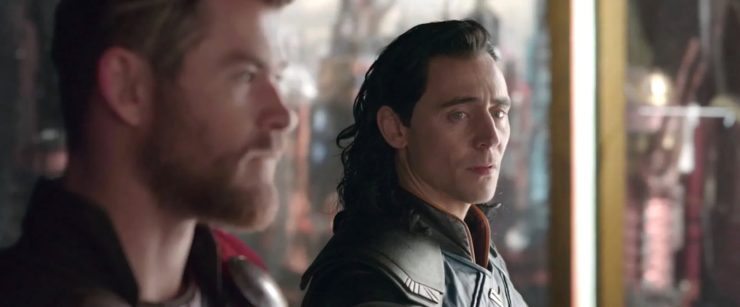
And in that moment, everything changes, putting the god of mischief on a path that sees him sacrifice his life for a mere chance at saving his brother from Thanos. All because Thor finally admitted that he mattered.
*
Here’s another.
The fact that the Doctor travels with companions, with friends, is a source of constant bemusement, anger, and frustration on the Master’s part. You see, those companions were supposed to be the Master, not sad little humans with their sad little lives. The Doctor tells Bill Potts this directly: When they were young, they made a pact to see every single planet in the universe together, but then they went in different directions. The Doctor decided to travel with other exceptional people instead, because he thought he had lost his best friend, never quite realizing that a conflict of morality hadn’t prevented the Master from believing that they mattered to one another.
The Master does horrific things, but here’s the catch: More often than not, they’re doing them to get the Doctor’s attention. They spend an inordinate amount of time just hanging out on Earth or other random spots about the universe, hatching evil schemes that never work out, drawing the Doctor’s eye to them over and over.
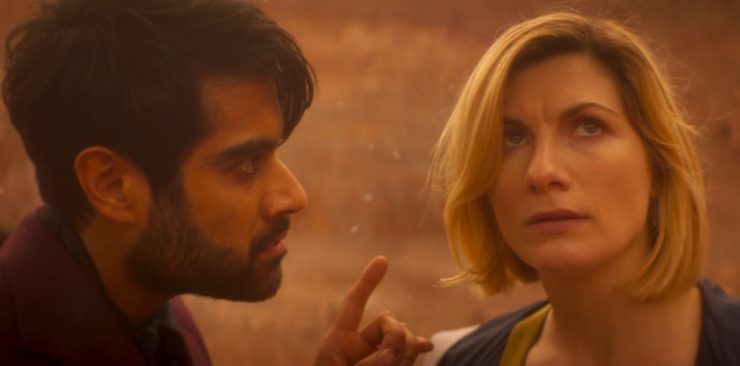
When the current iteration of the Master learns of the Doctor’s true history, learns that they weren’t actually contemporaries, he destroys Gallifrey over that knowledge. Sure, he dissembles, tries to deflect around his motives, but the truth of the matter is plain and painful to see. The Master always thought that the Doctor was his ultimate foil, that they helped to create each other from childhood onward. The instant that he learns otherwise, it utterly breaks his sense of self.
*
And then there’s this one.
When I was very young, several moves across the country during childhood assured that I didn’t have many friends. Most of the time I played alone, amusing myself with toys and games of my own design, putting on strange costumes and jumping around my room. I created complex worlds for my stuffed animals to occupy, tracked their movements, adventures, betrayals. Other children were often baffled by my ideas of what “make believe” entailed.
Groups of friends would come and go during this period, but all I wanted was one. A friend, my friend, someone who would think of me and only me. Someone who might deign to put me first. It was needy of me, and unfair, and it was absolutely selfish, but it was the only thing I wanted with every fiber of my beating heart. One person, who knew me, and who loved me all the same.
As I got older, I gained more friends, but I still retained that inclination toward bonding overmuch with one other person. People call those sorts of friends “best friends”, but there was something missing from that definition by my measure. All of the best friends I ever had, they had other people in their lives who mattered far more than I did. Other friends, family members, even themselves. I was not the person they defined themselves by.
Of course, they weren’t wrong to feel that way. But that’s a hard thing to understand when you’re still growing and your emotions don’t make sense to you. I was sure that I was being unreasonable in my expectations, but I didn’t know why, or how to communicate that to anyone else. I only knew that I couldn’t find anyone who wanted as much from me as I did from them. And I felt deeply ashamed of that fact.
It was difficult to articulate this sort of shame to another person, so I didn’t. Instead, I decided that there was something irrevocably wrong with me, something unnatural and painfully out of step. After all, the only people who put such pressure on their relationships… why, they were all villains, weren’t they?
*
Catra becomes a villain, for a while.
Catra spends her childhood knowing that she is less favored than Adora, but still clinging to their friendship. Once Adora defects to become the leading member of the Rebellion, once her identity as She-Ra comes to the fore, Catra decides that this relationship was the one thing keeping her back, and tries to divest herself of concern for Adora. She tries to fight her, to ruin her, to take her friends from her. Until eventually, she realizes that none of it is making her happy, that it will never be enough. Finally, she switches sides and saves Glimmer, and Adora comes to rescue her.
Before that, Catra recalls a memory from childhood—but this one was different from others we’d seen. A young Adora locates her to find out why she hit Lonnie, but Catra won’t answer the question. Later, Adora comes back to bring her to dinner, prompting Catra to suggest that she leave and eat with her new best friend, Lonnie. Adora asks if that’s why Catra got violent, and the response she receives is telling: “I know you like her better than me. You’re supposed to be my friend.” When Adora points out that she could apologize to Lonnie and then they could all be friends, Catra knocks Adora to the ground and vows never to apologize to anyone.
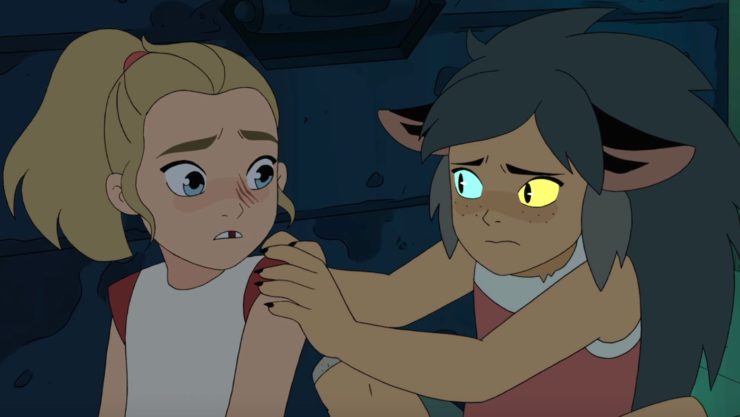
Before this moment, all of Catra’s backstory was couched in memories of Shadow Weaver’s clear preference for Adora, her promotion at Catra’s expense. But this memory makes Catra’s real pain stark as a blank sheet of paper—she wished for Adora to put her first.
Maybe that was needy and unfair and selfish of her. But it’s all she ever wanted.
*
My partner was assigned to be my roommate in my freshman year of college.
We bonded far too quickly and easily, and we never wanted to be out of each other’s company. People teased us about it, asking when we would admit we were dating, and we scratched our heads in perplexity. My roommate seemed to feel the same way that I did about friendship, but I knew that wouldn’t sustain; eventually he would realize that I was far too much, a sort of villain, and he would take a step back from me, the same way everyone else did.
I kept waiting for it to happen, in the months and years that followed. There was a boy that I thought he liked at one point, and I was certain that would be the end of us. Imagine my surprise when my roommate laughed at the mere thought of dating that boy. Imagine my surprise when he agreed to follow me after graduation, anywhere our lives took us. Imagine my surprise when he told me that he thought I knew. Somehow I’d missed it. Subsumed by the white noise of school and future planning and the constant undercurrent of believing that I asked far too much of others—
He chose me.
*
In every iteration I’d ever known, characters who asked so much of one other person were framed in villainous terms. It makes it hard to view their desires in a sympathetic light, which would seem to be the point—need is the messiest of human emotions. We aren’t meant to think of need as something valiant, or revolutionary, or beautiful. So when I saw Catra’s flashback and thought how closely it mirrored my own childhood, I was curious about where it was all going. I wondered if this would be another moment where need was framed as a weakness, as something small and ugly and best kept tucked away. I wondered it again when Catra admitted to herself that she loved Adora, but was certain that she didn’t feel the same way.
And then Catra followed her into the Heart of Etheria, where Adora intended to sacrifice her life. She refused to leave her. And when Adora considered giving up, Catra begged her to hold on—not for Etheria, or her friends. But for her:
“I’ve got you. I’m not letting go. Don’t you get it? I love you. I always have. So please, just this once… stay.”
Catra stood in front of the girl she loved and said, Please. Choose me.
Maybe that was needy or unfair or selfish. But… how could it be when that confession gave Adora the strength she needed to save the universe? And how can I ever feel bad about my obsessive, awkward heart again when I know now that this is the kind of power it possesses?
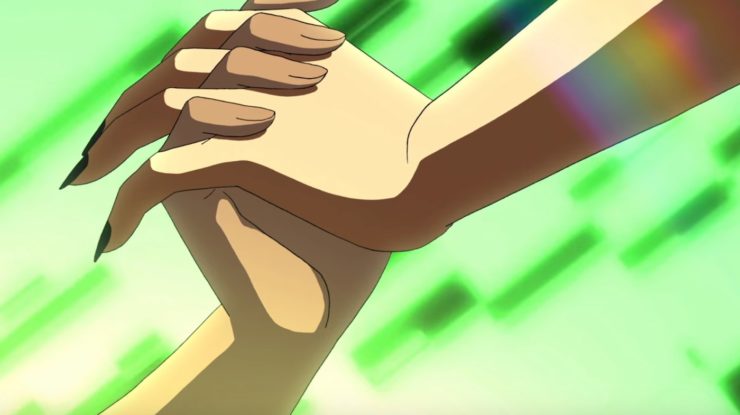
Throughout the finale, I sobbed so long and hard that I gave myself a headache. After it was over, I crawled into my partner’s arms and cried some more. And when I finally thought I could speak again without bursting into tears, I whispered, “Thank you. For choosing me.”
And he knew exactly what I meant.
Emmet Asher-Perrin would like to thank everyone involved in She-Ra for such an incredible journey. You can bug them on Twitter, and read more of their work here and elsewhere.










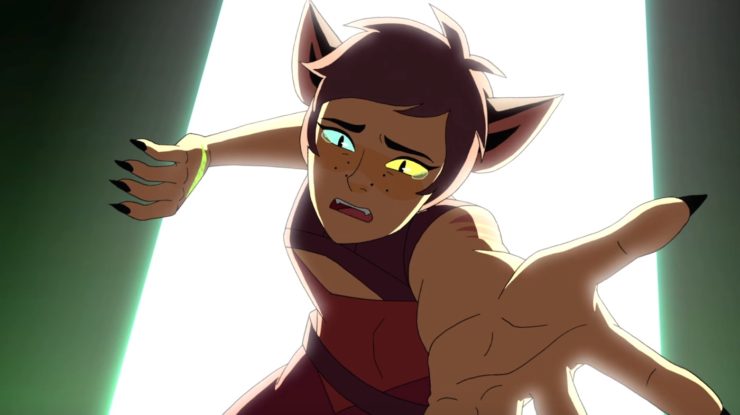
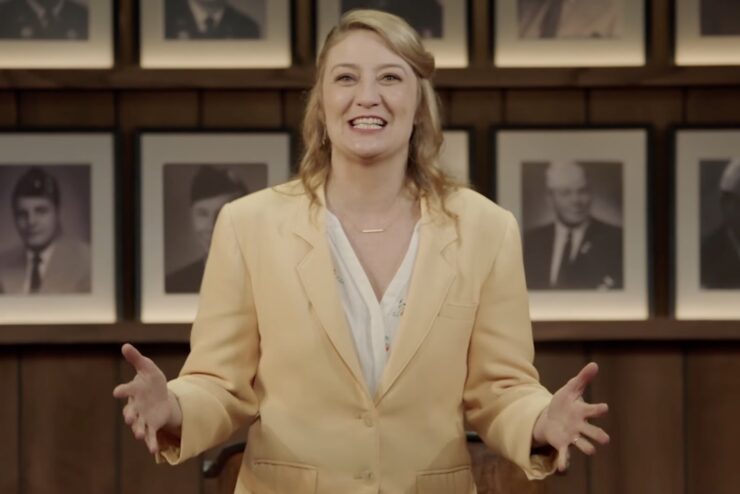
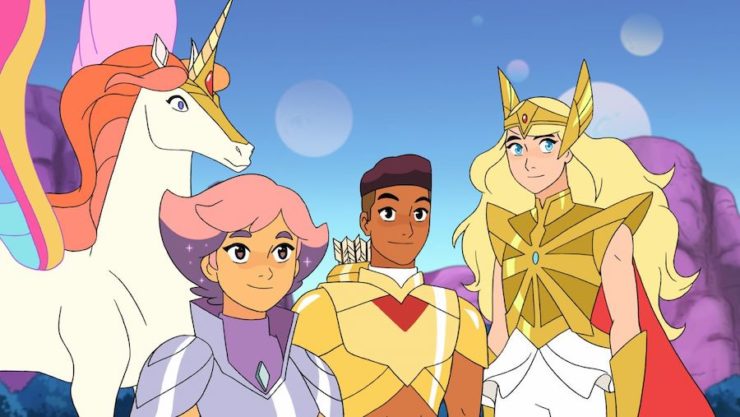
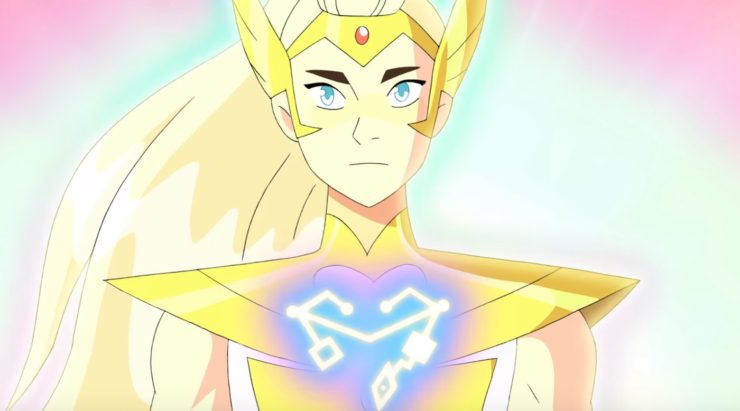
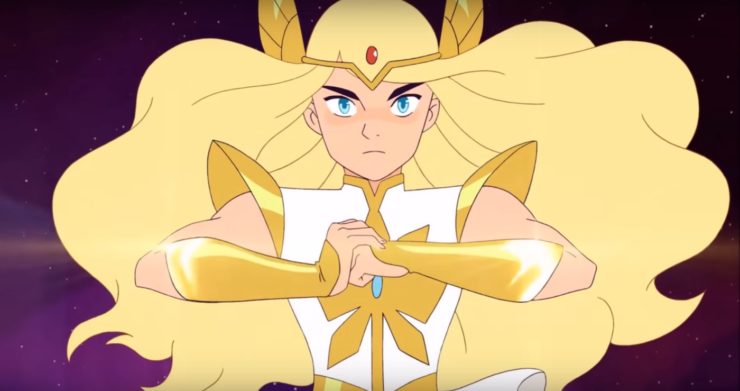
Look, if you’re going to tell my life’s story, at least pay me royalties.
I’ve always admired your writing, Emmet, but this… this one hits close to home. Thank you for being so open with us.
This could be me. Every word of it. Except I never found anyone who would choose me. And I understand completely. Every time I’ve had a “best friend” there have been multiple other people who had to come first in their lives before me. For obvious and valid reasons. But I always dreamed of finding someone who would choose me first.
Beautifully put. I just watched the finale last night and I basically can’t stop crying and this does such a good job of helping me understand why. Suddenly a lot of things in my life make a lot more sense…
Absolutely beautiful piece of writing. That’s all I’m gonna say because that’s all there needs to be said.
Oh, jeez, I’m just… crying, reading this. Even more so than I have watching that She-Ra finale.
I’m… I’m 35 years old and this is immensely relatable, but at the same time I’ve never found that one person for myself. I think… maybe I gave up on it about 10 years back. 12 years ago an online relationship crashed and burned, I was an ugly mess for months, and after sort-of-recovering from that, I did try again for a while, but… nothing felt right, and I guess I’ve never been good at communicating my intentions.
I’ve always thought of myself as a person more like Adora. Yeah, I’ll put other people before my own needs and put a lot of unneeded pressure on myself, but this past weekend I definitely realized that I’m way more like Catra, and anyone who might have been my Adora in the past is living an entirely different life now.
There is a horrible message often portrayed in media, that if someone has had a rough life, you have to endure their wrongdoings because everything is a product of their past and other bull like that, and as soon as they do ONE good thing, they are redeemed. I’m afraid this series did this and it sucks…Because yes, Catra is a villain, she killed Angela, she attacked Adora even when she tried to reason with her (Wow, she loves her so much!), she accused her of abandoning her when Adora realised what the horde was doing even when Adora told her and wanted her to go with her, among other things.
And after everything she did, she gets redeemed because there’s a worst threat out there, and it’s suddenly like the last 4 seasons never existed. If Voltron was mediocre with it’s development, She-ra straight up failed completely regarding this, and was just searching any excuse to make the fandom’s favorite couple cannon.
It was real growth for Catra to actually stay and make her feelings known instead of falling into the old pattern of lashing out and running off (or worse). I was prouder of her and Adora in that finale than I think I’ve ever been of two fictional characters. And yes, I allowed a single, manly tear to trickle down one cheek.*
* Translated: I was a blubbering mess, too.
@7 I agree. I actually was completely torn on this ending. On the one hand, how wonderful to see such representation of LGBT etc on screen with no preaching – queer relationships were normal as normal can be, and you actually had to look hard for straight ones. Spinerella and Netossa are wonderful and adorable, and same goes for George and Lance.
BUUUUUUT, Catra and Adora? Their relationship has been toxic from the start of the series and I’m sorry, but Catra tried to DESTROY THE WORLD because she couldn’t handle Adora being right. Adora gave Catra multiple chances to change her path and Catra admitted early on that she KNEW the Horde was evil but she stuck with it anyway. Their ending left me with a queasy feeling. At the very least they shouldn’t get into any kind of romantic relationship without a whole lot of therapy. For both of them.
I also have complaints about Sea Hawk and Mermista – in any other series his behaviour would be creepy at best.
And Entrapta and Hordak…..!
Both Hordak and Catra are both guilty of war crimes, and for it to be washed away with “But look, the good guys love them!” leaves a bad taste in my mouth. As Mermista says, “Soooo, we’re just ok with this now?”
Thank you for writing this. I’ve been going through this lately. I’ve had trouble ever since my best friend got married a few years ago (for context, she’s also my ex. The break up was mutual. But you can’t go back to being “just friends” when you’ve been more). But the last few months, everything has been shifting as they had a baby. I’m over the moon excited for them and I get to be an aunt to their daughter. But there’s been an intense shifting feeling of getting left behind as her life keeps changing away from mine. Your piece really put into words how I’ve felt lately. It really helped to have that perspective.
It’s nice to know I’m not the only one who feels this way. Thank you so much for writing it.
Ooh, philosophy. Love can be a very destructive emotion. And sometimes the ability to love is treated in fiction as the difference between gold people and bad people. If you’re in a universe where your characters aren’t all human, it can even be part of the physical make-up. But while love is usually seen as a positive thing, as ever, the important thing isn’t whether or not you feel something, but what you do with it, how you express it. To me, love is about putting someone else first. Not before everyone else in the world, but before yourself. I guess we all want to be loved like that, and there’s not necessarily anything wrong with that, but attempting to possess someone else and control them is not healthy. Especially if they don’t want you to. And if your way of expressing your love is to murder people and destroy planets, then by any standards, love has made you a villain. Maybe you can be redeemed if you can find the way to actually help the person you love and, perhaps more importantly, the other people that matter to them. But it doesn’t mean you weren’t a villain once.
But hey, what do I know? I’m 40 years old and I’m not 100% convinced I’ve ever loved anyone. I’ve definitely never possessed anyone, or really tried to, and there’s always the worrying feeling that I don’t love my family as much as they love me. But I still try to do things for them and I take pleasure in making them happy. Try not to let love make you a villain.
There’s definitely a part of me discomforted by Catra actions and things she does to Adora and the others through the series, not to mention Hordak’s actions for years. I can see why people are concerned over the attempts to fix an abusive partner or relationship.
However, in the literary context of the series, the way I see Hordak and Catra–both very damaged people abused and manipulated by their authority figures–in the end is that season 5 is the START of their redemptions. It moves too quickly for anything else; the fight versus Prime doesn’t leave a lot of room for them to work on things (especially for Hordak), though Catra starts to try. Prime being so much worse, and doing such terrible things, is used not only as a reason he has to be stopped, but also for those two to realize the depth of their own errors and the horror it brings them personally; they have nowhere to go from the low Prime takes them, except up with the help of the people who have been trying to reach out to them the whole time.
Still, the characters’ reactions to Catra throughout, and Mermista’s comment at the very end, makes it clear not everyone’s forgotten, nor will they all be quick to forgive. But the series ends on the climactic moment of Prime’s defeat and not the messy fallout sure to occur on Etheria and everywhere else.
Glimmer recognizing her own responsibility for bringing their world to Prime’s doorstep, and how that changes her relationships with Bow and others, is also an indicator of that mindset. Basically, much of the season’s interactions among the heroes are shorthand for “there’s a lot for the characters to unpack and work on once the battle is finished.”
Seems to me this is all about how love CAN make you a villain. A desire to be first with a particular some one is understandable and sympathetic but it doesn’t make you any less of a villain if you choose to act out by inflicting pain and suffering! It also seems to be transferring the blame for the villainy to the object of obsession. It’s all their fault the villain is a villain! Though I’m sure that’s not Emmett’s intention.
I always feel a little uneasy with discussions on character redemption, because I tend to see them shake out to “This character isn’t redeemable”. Obviously, I don’t agree that a character cannot be redeemed through deeds in the series so long as they face the people they hurt, but I guess going into the ‘why’ of that means I have to go into the weeds of what makes a redemption..
When you see character redemptions in media, there are four types:
1) The writing ignores there was personal hurt to every individual impacted by their actions as well as general hurt done to society. So long as they’re on the good guys’ side now and thus are generally a force for good, they’re ‘redeemed’.
2) The things they did weren’t that bad/they didn’t know they were doing it and the moment they do they swear off it. (This would be a case as with Adora, where it’s a side-switch for a hero rather than an actual villain redemption)
3) The character goes out in a sacrifice play to save the heroes, thus absolving the character of any further actions, the Big Sacrifice.
4) The character has to want to be redeemed, has to live with what they’ve done, and has to not only become a force for good but personally face and apologize to every new person.
Of course, there’s also the fifth, hidden option: Someone who has done Big Villainy is no longer capable of redemption.
A lot of people (including a lot of mass media) seem to consider #3 the only valid approach, and it’s honestly probably my least favorite at this point because it’s also the most avoidant approach. There are no apologies, no lifelong work to be done by a character if they say something like, say, “He may have been your father but I was your daddy” and then goes and dies to save the protagonist he’d originally abused. Like, well, there’s nothing you can say to that, can you? Case closed they did the One Good Thing (instead of One Good Thing and then small amendments through the rest of their life). And I’m seeing this over and over, because… survivors are messy. Having to continue to deal with the fact the harm doesn’t go away just by you doing good things now is messy. And mass media hates a mess. So instead of having a character have to apologize over and over again and continually make good choices and work on themselves not just for their own sake but for those they hurt… they just kill them.
I feel like She-ra as a show addresses this personally, too: in Shadow Weaver’s end. She DOESN’T redeem herself either by acting good or self-sacrificing, she just wants to be perceived (in both) as a good guy and be liked again. She doesn’t apologize. She continues to manipulate people to the end. Even her giving Adora & Catra closure is done because she has decided to Do A Good That Will Be Remembered and is manipulative (she KNOWS she has been playing them off each other with one of them the Good Kid Who Will Do Great and the other the Bad Kid Who Will Never Measure up — this is a common abuser tactic — and so even the “I’m proud of you” is born out of the awareness of the pain point she’s manipulated all these years).
Anyway, this isn’t targeted at specific commenters here because I’m also like… on twitter and tumblr, so I am seeing a lot of people saying that Catra shouldn’t have been redeemed and that makes me… nervous? What are we saying about media here if someone acting out of her history as an abused child is not considered to have done enough when she both takes huge steps to help save the world and repeatedly apologizes to individuals as well? Catra is a young adult. She was deliberately manipulated into thinking she would never achieve anything at all, was raised since she was a toddler in a place that literally called itself the Evil Horde, and when the only person she actually felt cared about her just left to go to the other side, she clung to her only outlet being ‘proving everyone wrong’ (or, perhaps, proving everyone right: if she’s going to be a bad kid no matter what, she’s going to be the best at being bad).
And at the end when she was faced with seeing its actual impact she looked at what she was doing to the world, to others, and to herself, and said ” I can’t do this”. She intended to die — to save Glimmer and thus possibly save Eternia at the cost of her own life — but inconveniently for her and for a ‘tidy’ sacrifice play, she was saved, and had to face the people she’d harmed. And so she… began helping them genuinely and with a full heart, and went from “I will never apologize for anything” to “I will apologize for everything to everyone” and just… continued to do this. It wasn’t shown for Every Character (almost certainly for time purposes — a LOT was cut down to fit the plot in here) but it was shown for every major one we (and Catra) know Catra had an impact on.
I’m pretty sure Entrapta’s “I forgive you” was the first she realized that forgiveness might be possible on a slow, individual level. She never approached it as something that was owed to her by anyone, let alone everyone. She just… decided to face what she’d done to Entrapta, apologize, and got that realization as a result.
IDK. I see a lot of people fall on the side of “People who have done bad, regardless of their motivations and their desire for change, cannot be redeemed, unless maybe they die” and I feel really uncomfortable with those implications — both in real life and in media. Because I’m not sure what Catra could have done MORE here to redeem herself, and it sounds like a lot of people still aren’t seeing it as a valid redemption. If actively a) wanting redemption, b) helping to save Eternia, c) working on her anger issues and similar toxic habits onscreen, d) apologizing to new people as an ongoing thing, and e) attempting to support and lift them up instead of drag them down to fall with her isn’t redemption, what is?
If it’s only “death or nothing”, that’s depressing, at least to me.
Anyway, here’s an interview with Noelle Stevenson talking about the themes of redemption in She-Ra to close this off.
@15. I’ve been seeing the same things elsewhere, and yeah, it seems like the concepts of forgiveness and mercy are falling out of fashion (I heard similar complaints that Steven Universe didn’t end with the executions of the Diamonds and the genocide of Homeworld).
I get it that a lot of people in real life have been abused and are not prepared (and are certainly under no obligation) to forgive their abusers, but I feel that fiction plays by different rules, in that we-the-audience are shown a measure of the internality of both abusers and abused.
The theme of this article is unfortunately incorrect, as love can make you a villain.
There’s nothing wrong with wanting to be first, or even needing it. There is everything wrong in thinking that other people are less important or less real than you are, and hurting the ones who stand between you and the object of your affection.
Love is a feeling. Love is also a choice. You can feel love for someone while acting in ways that harm both them and other people, and so fail to show love by refusing to accept that other people have their own feelings and desires which may not always be convenient for you.
Forgiveness is complicated and difficult and painful, but on some level it is also not rational. You don’t forgive someone because they’ve earned it, you forgive someone because they need it. Forgiveness is as much about the person giving as the person accepting.
Adora doesn’t forgive Catra because Catra didn’t do horrible, evil things. Catra needed forgiveness because she chose to do horrible, evil things.
I’m crying. Beautiful piece, beautiful show. Thank you for sharing this with us.
You made me cry good tears. This is my feelings. Like you knew exactly how I felt. Moving around, not having friends, wanting someone who wanted me back the same. I found mine on Facebook 9 years ago and it took me a few years to realize that this was the relationship I was so looking for. Thank you so much for writing this article. I am going to watch the She-Ra show now. The picture of Carta is what brought me to read.
It was just really shoddy writing, honestly. I’m glad you got so much from it, it sounds like it hit you like a therapy session that you needed, but thats alot of projection. #7 is dead on for this one. Really poor continuity.
You’re an excellent storyteller and it feels wonderful to be understood by strangers.
I think this show is letting us all feel legitimized. I feel heard, not only by fellow fans, but by the creators of the show as well. I don’t feel like a crazy outsider gasping at straws, looking for a shred of evidence that these characters feel things I also feel.
Thank you for sharing your story.
tldr I’m sobbing and I don’t know why
Thanks so much for this Emmet. I hope one day someone chooses me.
Its barely 730am for me and I’ve read this article half a dozen times and my eyes are burning from crying.
I’ve spent my life believing I was fundamentally inadequate. That I needed to try harder, do more, be more accommodating and that would guarantee I’d be seen as necessary, not a placeholder for someone else. I know I’m important to plenty of folks but not THE most important.
Which makes me feel selfish so I try harder to be less needy bc no one wants someone so selfish, so villainous in their lives. No one chooses the villain first.
As a teen I related to Yui, in Fushigi Yugi, hardcore. I hated Miaka bc Miaka betrayed Yui (unintentionally and unwittingly). I clearly remember thinking “she’s your best friend, you don’t choose a guy over your best friend”. At the time my best friend had essentially left me for her boyfriend. Our friday sleepovers had become friday dates with him. Our lunch time chats had become her studying with him.
I had no interest in dating, but bc his friend was interested in me, my best friend begged me to go on double dates with them. And bc I wanted to make her happy, I went on those dates. Until when he tried to kiss me and I said I wasn’t ready, he called me a frigid b**** and told his friend he wouldn’t go out with me again. Which is when he told my best friend it was me or him and my best friend turned on me saying if I wanted her happiness I’d leave her alone.
Its a pattern that repeats so often I fall into it too easily. And it hurts. So much. Just once I want someone to defend me, to defend my happiness, to say “What do you want?” and mean it, not just ask as a precursor to wanting a favor from me first.
I don’t need to be their only focus all the time, I just want to be it some of the time without being made to feel I was wrong to want to have that focus.
Everybody has a right to their needs . But there’s no cure when those needs conflict. Somebody is going to be hurt, very often both are hurt. No cure….
Thank you so much for opening up, and sharing. Beautiful.
This rang so incredibly true to me as well! I knew from the first episode that Catra was my fictional type, and that flashback sequence hit me really hard. But this articulates all of that and things about my inner self as well so clearly and beautifully. I cried while reading it!
Also, I’m glad you found someone who chose you, Emmet.
Thanks @17, you nailed it.
Here’s the thing I don’t see a lot of people talking about: Scorpia DID choose Catra. Scorpia chose Catra a hundred times, against her better judgment and her conscience and her own needs, until she was finally forced to set boundaries. I honestly thought their relationship was the most emotionally intense in the series, watching Scorpia truly and purely love Catra had so many ups and downs, exciting moments! (for me, anyway, I cried a lot) Catra & Adora, while relatable and harsh, was always kind of… I get it, they’re in love, they broke up and Adora’s trying to move on but Catra can’t get over it but yes, I GET it, they’re in love. Now listen to Scorpia, who literally only wants to make you happy.
And yes, this is coming from me struggling on a similar path Emmet’s my whole life, relating so strongly to this article, but worse, worse: seeing it go so much more wrong in close friends when these feelings aren’t tempered. No, love doesn’t make you evil. But love makes you dangerous – and not recognizing that means someone is going to get hurt.
I do say that I think the writing handled it BEAUTIFULLY (except for cheating Scorpia of a touching reunion with Catra), and I was totally rooting for Catradora in season 5 – like #17 said about writing a villain who has to live with their redemption slowly and painfully, I think the show demonstrated that this wasn’t an instant blank slate for Catra, that it was something they all needed to work through. It was really well done. But looking at it as a perfect happy ending for the queer community is unfair, I think… queer relationships have problems, too, things people need to work on. The whole show was filled with lessons on communication and how friendship takes WORK, and we shouldn’t just skate right over that part!! It’s important to remember that all relationships (romantic or otherwise) require effort… effort Catra decided to make, and kudos to her. A HUGE triumph for us all.
But as much as “don’t come back for me”/”leave me for dead” is a selfless act of sacrifice hoping for redemption, it is, so often, a selfish, selfish test, that says: If they don’t come back for me, I was right all along about how I wasn’t worth it, you didn’t love me. It is always, on some level, manipulative. It’s a plea for someone to prove how much they love you.
But also, I screamed YES!!!!!! and pumped my fist in the air when Catra & Adora kissed, after having yelled GAY at the screen the whole season. It was amazing.
It’s just that so is Scorpia. And she was there the whole time.
A big NOPE for me. Loki had a redemption arc, he helped and yet Thor was a little unsecure with him at the end.
Catra had no redemption arc, she was a little pain in the arse for Adora, she tried to kill her and the gang SO MANY TIMES. Nope, Catra has no right to be pardoned after what she did. She change until the very end, when she knew she was gonna fail once again but this time she had no chances to fight against the bad ones. That’s not redemption, that’s being a coward.
Aaaaand now I’m crying with love again. <
Hello,
I knew there was something about Catra that resonated with me but I couldn’t quite put my finger on it. After reading this I see her in a whole new light. I see myself in a new light. Thank you for being so honest about how the last season made you feel. I’m happy that you found someone who chose you!
Obviously, this brought up a Lot Of Stuff for many people. Thanks for an excellent article. Catra resonated with me too – many of us just want to be first in That Person’s eyes (which is why Catra couldn’t even see Scorpia). It’s a tough – and very human – place to be.
For a darker exploration of this dynamic, watch Killing Eve.
I’m laughing at how many of the comments missed the entire point of your article and are now tearing Catra down saying she didn’t deserve redemption.
Loved the article, really pinpointed why I related to Catra so much. :’)
I just want to say that this is such a beautiful thing to read. It made me realize something about myself that may help me in my journey of better-ing myself. Thank you.
Quick reminder: You’re welcome to disagree with the opinions expressed in the article or in the comments, but please keep the tone of the discussion civil and constructive; aggressive or dismissive comments do not help to further the conversation. Our full commenting guidelines can be found here.
This story is beautiful! I’m also Catra to my Adora.
Did Adora ever apologize to Catra (as well as the rest of kids she grew up with) for seemingly forgetting that she (they) existed and abandoning her (them) to the continued abuse and brainwashing of the Horde the second she met her shiny new friends?
If as soon as discovering how bad the Horde truly was, Adora ran back to save her family and was instead rebuffed by them, then I would’ve understood her decision to abandon them, but that’s not what happened at all (in season 1). She just…forgot and Catra had to come looking for her instead, believing that the Alliance had captured and brainwashed Adora.
It’s been a long time since I watched the first season, so my memory of it is pretty hazy, but I do remember that the whole thing just left me extremely frustrated because the writing never seemed to touch upon this pretty significant small detail about Adora’s personality. I’ve been very hesitant to keep watching because of this. Although, I suppose I kind of spoiled the ending for myself here. I am glad Catra did get some kind of redemption even though I’m not sure if she deserves it.
Did Adora ever apologize to Catra (as well as the rest of kids she grew up with) for seemingly forgetting that she (they) existed and abandoning her (them) to the continued abuse and brainwashing of the Horde the second she met her shiny new friends?
If as soon as discovering how bad the Horde truly was, Adora ran back to save her family and was instead rebuffed by them, then I would’ve understood her decision to abandon them, but that’s not what happened at all (in season 1). She just…forgot and Catra had to come looking for her instead, believing that the Alliance had captured and brainwashed Adora.
It’s been a long time since I watched the first season, so my memory of it is pretty hazy, but I do remember that the whole thing just left me extremely frustrated because the writing never seemed to touch upon this pretty significant small detail about Adora’s personality. I’ve been very hesitant to keep watching because of this. Although, I suppose I kind of spoiled the ending for myself here. I am glad Catra did get some kind of redemption even though I’m not sure if she deserves it.
You bringing up Loki and Thor made me realize their upbringings being quite similar to Gamora and Nebula under Thanos. The abused sibling often being punished for not being “better” which develops deep-seated resentment and an inferiority complex over the course of many years. Catra was able to keep it down and hide her emotions around Adora for the sake of their friendship as we see in ‘Promise’, but Adora choosing to leave the horde for strangers despite previously choosing to not fall out of favor with Shadow Weaver for Catra’s sake (“You’re going to throw everything away for… them?”) is what pushed her to her limit. Discovering that Adora’s She-Ra just allowed all those emotions to boil over.
And I love being villainous.